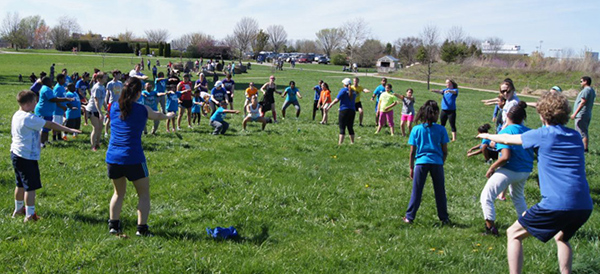Medical Students Act as Exercise Mentors to Pediatric BMI Patients
Chance Ridgeway hasn’t stopped moving for 45 straight minutes.
Sweat beads form on the brow of the 11-year-old as he vigorously touches his left elbow to his right knee, then meets his right elbow to his left knee. This jerky dance move is repeated again and again. To his right, exercise partner Chris Brown challenges Chance to pump his knees up a little bit higher.
When the hip-hop song blaring from a nearby lap top computer stops, Chance collapses to the bed of grass beneath his feet. Right now, Chance isn’t interested in counting calories or heeding his doctor's recommendation of daily exercise. As evident by the grin sealed across his face, Chance is fixated on having fun with Brown, a third-year medical student who pushes him to try harder every few seconds.
“It’s a team effort,” Chance said, sipping a bottle of water before springing back to his feet.
Since February, Chance has gathered with about 25 to 30 patients from the UK Pediatric High BMI Diagnostic Clinic every Sunday at the UK Arboretum or the Charles Young Community Center gymnasium to exercise with a UK medical student mentor. The patient-student pairs stretched their muscles, ran laps, performed aerobic routines and played active games during the clinics, which were held throughout the spring season.
The weekly outdoor clinics, or "fun runs," were organized by UK medical students committed to helping pediatric BMI patients incorporate an hour of outdoor exercise into their weekend schedules. Patients were assigned at least one medical student partner before every clinic. Some children set a goal of running a full lap around the arboretum's paved trail, which is about 2 miles long. Other children experienced the delight of group exercise and exercise partner accountability for the first time.
Nazeeha Jawahir, a third-year medical student, introduced the idea of a weekly exercise clinic for pediatric BMI patients after working in the clinic and volunteering with children at a hospital in rural Asia. She realized unhealthy habits were spreading to children in underdeveloped parts of the world, and she wanted to do something to prevent more children from suffering from the dire effects of inactivity and obesity.
She recruited a group of her medical student peers, some of whom already had experience working in the Pediatric BMI Clinic, to serve as exercise mentors to children on a weekly basis. Rather than shaming or forcing children to work out, the medical students modeled physical activity as something fun, easy and rewarding.
"I think we can make little signs of progress," Jawahir said. "I don't know if we can overcome it, but it doesn't mean we shouldn't try. Emphasizing the importance of being active and making exercise a part of daily life can only help them."
Chance's mom Tonya Ridgeway notices her son is more energized when he's engaged in some form of physical activity. Instead of napping, Chance chooses to go play outside, fly a kite or ride his bike. Chance has worked with Dr. Aurelia Radulescu, a pediatrician at Kentucky Children's Hospital, for two years, and he is maintaining his current weight.
"As long as there's a game involved, he's interested," Ridgeway said of Chance.
Stephanie Day knew her son Travis Lowery needed to change his habits when he had trouble with snoring and breathing at night. Since the 11-year-old started being seen at the UK BMI Clinic, he's lost 13 pounds. Travis plays team sports including football and baseball, but the Sunday clinic with the medical students is his favorite event of the week.
"You can tell the kids are so excited," Day said. "They get so involved. The medical students being with them makes it even better because they have a partner."
More than 50 UK medical students volunteered as exercise partners for children this spring. Jawahir and a team of students are working to continue offering outdoor clinics to pediatric patients starting again in August.
MEDIA CONTACT: Elizabeth Adams, elizabethadams@uky.edu
